On Monday afternoon, Waco Family Medicine (WFM) hosted “Flavor Feast,” a free lunch at the Meyer Center for community members experiencing homelessness. The event included a meal provided by Part Time Chef and a cooling station for attendees.
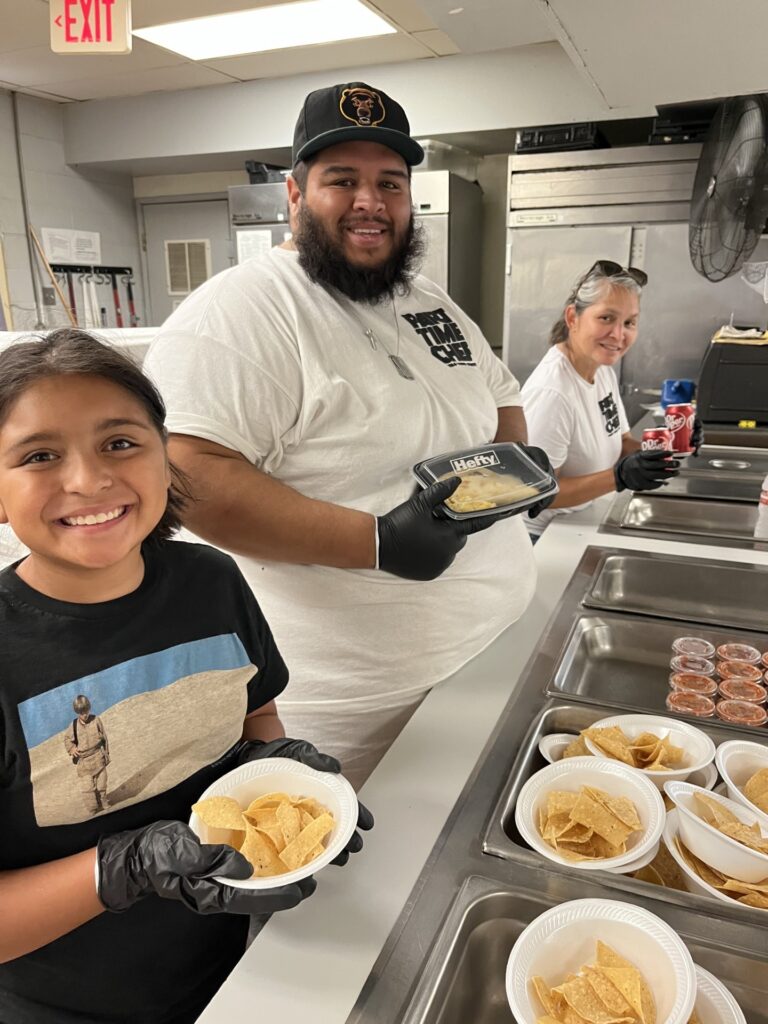
The event kicked off WFM’s recognition of National Health Center Week (NHCW). NHCW is an annual observance sponsored by the National Association of Community Health Centers (NACHC) running from Aug. 6 to 12. It aims to raise awareness and honor the contributions of Community Health Centers (CHCs) like WFM that provide comprehensive healthcare services to millions of patients across the U.S.
WFM’s NHCW programming includes People Experiencing Homelessness Day (Monday), Patient Appreciation Day (Wednesday), and Health Center Staff Appreciation Day (Friday). Patients and staff will be recognized with tokens of appreciation later in the week.
Each year for NHCW, WFM hosts Healthcare for People Experiencing Homelessness Day to highlight and expand the care provided to community members experiencing homelessness in Central Texas. People who experience homelessness endure higher rates of chronic and acute disease, behavioral health conditions, and other needs that are connected to poorer health outcomes, disability, and early death. Located downtown in the same building as Mission Waco’s Meyer Center, Waco Family Medicine – Meyer Center treats more patients experiencing homelessness than most other locations in the clinic system.
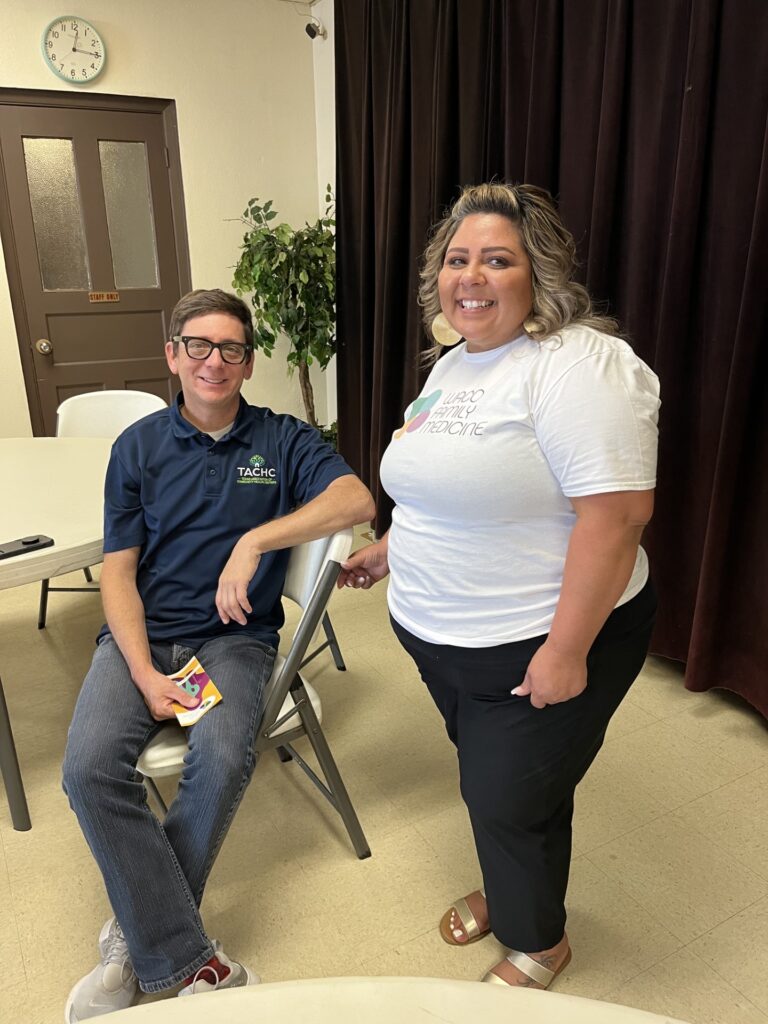
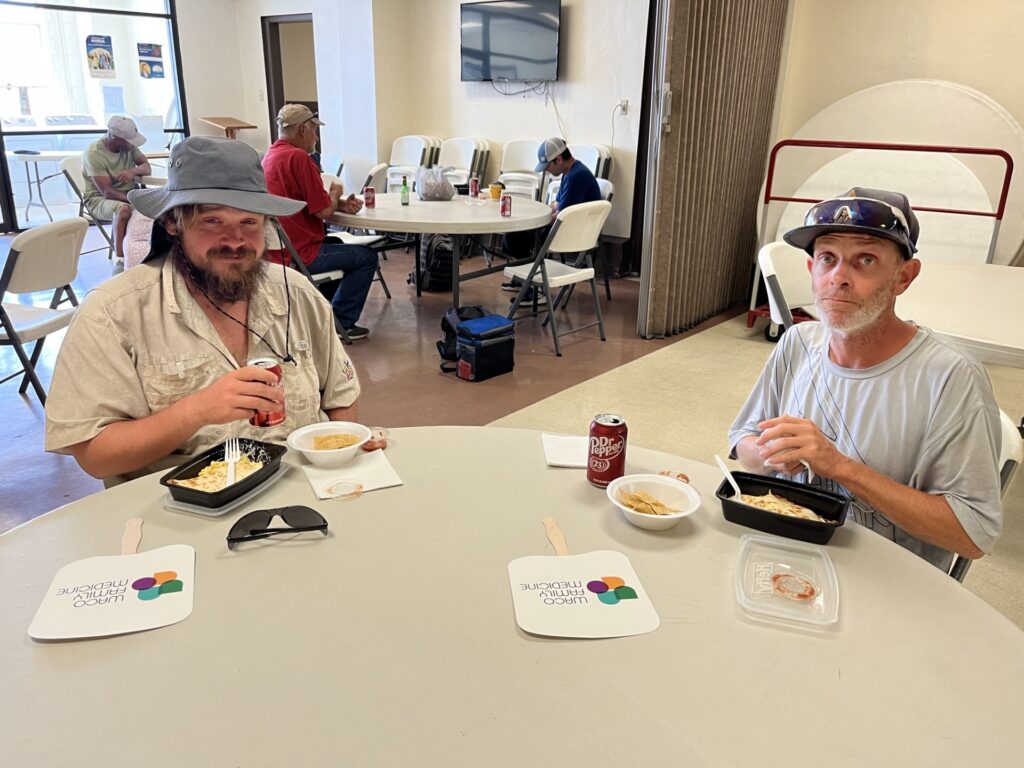
In 2022, WFM provided more than 61,000 patients with integrated medical, dental, and behavioral health care across 15 clinical sites. WFM addresses social and environmental barriers to wellness through innovative programs and community partnerships. Additionally, an in-house pharmacy provides quickly filled prescriptions to patients at a fraction of traditional costs.
With a quarter-million patient visits annually, the WFM system cares for one-fifth of McLennan County’s population. Ninety percent of county residents live within 10 miles of a WFM location, making care more accessible to patients, especially those with limited transportation. In 2021, about 74% of WFM patients identified as a racial or ethnic minority, and 22% were best served in a language other than English. The organization strives to provide high-quality, equitable care to meet the medical needs of Central Texans.
WFM invites community members, partners, and supporters to follow the organization on Facebook and Instagram (@wacofamilymedicine) to learn more about the social and economic contributions of CHCs throughout NHCW.
###
Waco Family Medicine is a Federally Qualified Health Center providing medical, dental, behavioral health, and community health care at 15 locations across McLennan and Bell counties. The nonprofit also provides graduate medical education through Waco Family Medicine – Institute and serves as a clinical training site for medical residency students, dental students, physician assistants, nurse practitioners, clinical social workers, pharmacy students, medical technicians, and allied health caregivers. WFM was established in 1970 to address a shortage of doctors, lack of access to primary healthcare, and economic development issues.
By Ferrell Foster
Waco may be on the verge of greatness. This thought came to me this morning as I reflected on two true things — our town seems to be facing the reality of its high poverty rate, and we also seem to be taking the arts seriously.
It may seem odd to tie these two things together, so let me try.

No city can be great when such a high percentage of its population lives in poverty. There is all kinds of data to prove this point, but you can also drive into certain parts of town and convince the other side of your brain of this truth.
The poor will always be with us, as someone famous once said, but that did not prevent him from caring deeply and working on behalf of the poor. That guy’s name was Jesus, and people are still talking about him, even worshipping him, 2,000 years later.
So, yes, there will always be people who live in poverty, but that doesn’t mean the rest of us shouldn’t work our tails off helping as many as we can. We help them in the short term by dealing with basic needs (food and shelter), but the most important help comes in the form of education and job training — things related to earning a liveable wage. A minimum wage job cannot support anyone adequately unless they are living with someone else.
And, by the way, our very best schools should be in our very poorest neighborhoods. That’s where it is most needed. But, in Texas, we have the opposite. The best schools are usually in wealthier neighborhoods. Education takes money, even though some don’t like to admit it. Those same people often pay more for housing or private schools for that very reason — it takes money to educate children while parents are working elsewhere.
The other side of this coin is promotion of the arts. This is not often understood as intuitively as the other. We are so enmeshed in a capitalist society that we can easily think business and money-making are the most important parts of building a community. Business and money-making are essential, but addressing poverty and promoting the arts is equally important.
Why the arts? This sector is much like the spiritual sector (of which we already have great strength). Both promote a connection to truth and concerns beyond oneself, and when we connect to deeper Realities we generally become more attuned to the people around us, or we should. Sometimes American religion can be very self-centered (as in “my” salvation) and undermine broader concern, but Christianity and other religions lift love of neighbor to equal footing with love of self. Self-esteem is good (you are created in the image of God), but neighbor-esteem is just as important (they are created in that same image).
More than 100 years ago, Evelyn Underhill understood the connection between spirituality and art. Artists, she said, are “aware of a more vivid and more beautiful world” than other people. They are “always driven by their love and enthusiasm” to express before others “those deeper significances of form, sound, rhythm, which they have been able to apprehend.”
Artists can do this because “they taste deeper and deeper truths, make ever closer unions with the Real. For them, the duty of creation is tightly bound up with the gift of love,” Underhill wrote.
This is why we need artists, just as surely as we need preachers. They help us to connect with the broader realities that many of us identify as God, while others identify it in other ways. This makes, or should make us, better neighbors. And better neighbors make better towns.
And, by the way, the creativity of the artistic mindset can be financially profitable, as well. For proof of this look no further than our very own Joanna Gaines. Joanna’s creativity with Chip’s business sense as built something important that is benefiting many.
Almost 30 years ago, the band Jars of Clay recorded a song titled “The Art in Me,” which included these lyrics:
“Sculpting every move
You compose a symphony
And you plead to everyone
See the art in me
See the art in me
See the art in me.”
(Songwriters: Charlie Lowell / Dan Haseltine / Matthew Ryan Bronleewe / Stephen Daniel Mason)
May we see the art in each other and work to help each other, both in our struggles and in our art.
Ferrell Foster is senior specialist for care & communication with Prosper Waco. He is also on the Board of Directors of Act Locally Waco and a regular contributor to the blog.
The Act Locally Waco blog publishes posts with a connection to these aspirations for Waco. If you are interested in writing for the Act Locally Waco Blog, please email the ALW team — [email protected].
Atmos Energy recently donated $5,000 to the McLennan Community College Foundation to help support Paulanne’s Pantry, the MCC food pantry.
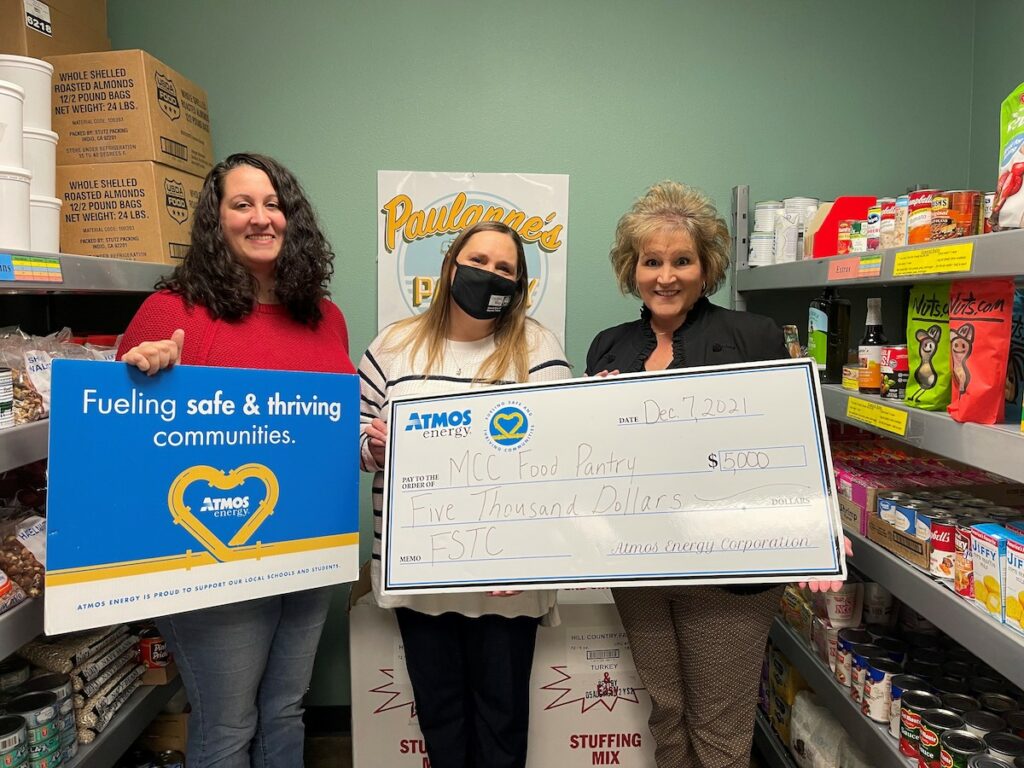
“This gift will do so much to help us serve students who are working hard to support themselves or a family while they attend college,” said Kim Patterson, the foundation’s executive director. “Hunger is a real issue on college campuses, especially at community colleges where many students live perilously close to the edge of financial security. We are incredibly grateful to Atmos Energy for their commitment to support our students.”
The gift will enable MCC’s pantry to provide meals for up to 200 students because of the pantry’s supply partnership with the Central Texas Food Bank, according Natalie James, Completion Center associate director. Students who access the pantry are typically limited to one visit per month and are provided with coaching to help with accessing other community resources. Each pantry visit provides enough food for three meals for a family.
Paulanne’s Pantry was named in honor of Waco resident Paulanne Ream Hoover, who left a gift to the MCC Foundation in her estate plan. This gift funded an endowment to cover basic costs of pantry operations, as well as establish the first scholarship fund for part-time students at the college.
The MCC Foundation raises public and private support to fund scholarships, faculty and staff professional development, emergency aid and capital needs at the college. To learn more, visit www.mclennan.edu/foundation or contact Patterson at 254-299-8606 or [email protected].
The Act Locally Waco blog publishes posts with a connection to these aspirations for Waco. If you are interested in writing for the Act Locally Waco Blog, please email Ferrell Foster.
By Maddie McNamee
On June 14, the Waco ISD Summer Food Service Program returned to Waco with promises to provide meals for all children ages 1-18, regardless of their enrollment in school. The program, which has been in effect in Waco for a few years now, was a saving grace for many families last year who were financially impacted by the COVID-19 pandemic. Food insecurity became a global issue as income began to dwindle and everyday expenses remained. The Summer Food Service Program took some of the financial burden away from struggling caretakers and ensured that no child would have to worry where their next meal came from.
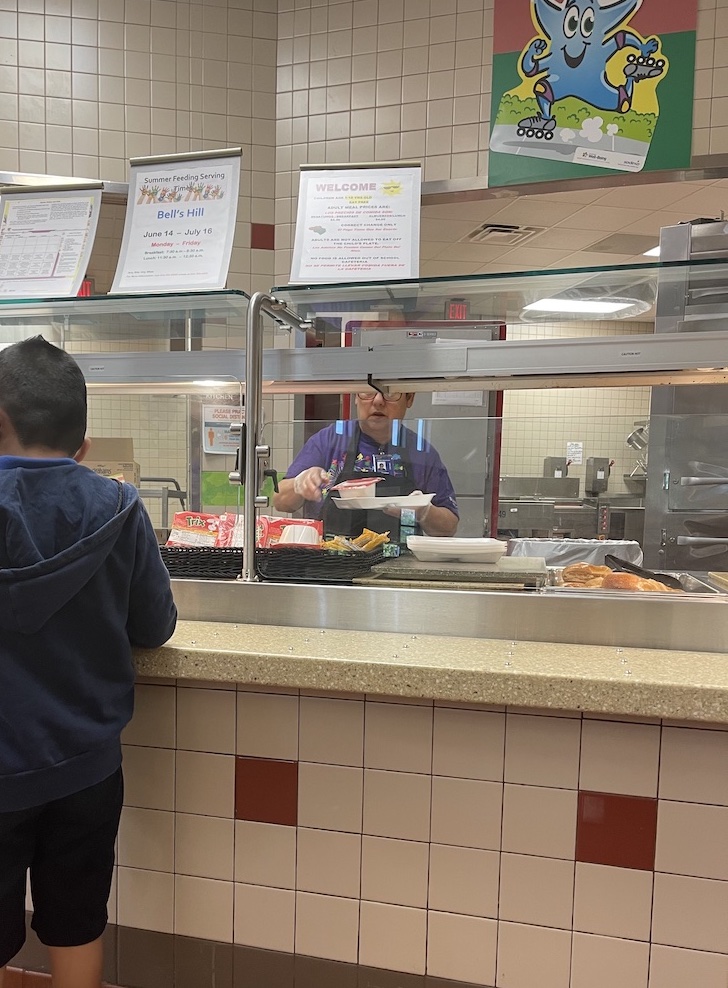
With the distribution of the COVID-19 vaccine and the end of the pandemic in sight, Waco seems to be showing signs of healing. Businesses are reopening, restrictions are being lifted, and people are reuniting with their loved ones. Going for a quick drive around Waco only to get stuck in traffic feels like things are slowly going back to normal.
Despite these returns to normalcy, food insecurity is still a very real and prevalent problem in Waco. An issue before the coronavirus, the challenge of putting food on the table, only became greater when the world went into lockdown. It is easy to wish for things to go back to normal, but it is also important to remember that while the option to go to a restaurant is now available, not everyone has the financial ability to do so after such a challenging year.
The Waco Independent School District identified these difficulties that residents of Waco were facing and not only brought the Summer Food Service Program back, but expanded it substantially, making it easier for children to have access to a free breakfast and lunch seven days a week. With 38 locations serving the free meals at designated times, every child in Waco should have the opportunity to enjoy the return of a semi-normal summer without the pangs of hunger.
The service will run Monday through Friday, with the exception of July 5, when it will close for the Independence Day holiday. Packaged meals will be available to pick up for the weekend on Fridays. With the return of school in the fall, the program will end August 18. For more information on service times, locations, and updates, you can head to https://www.wacoisd.org/summermeals. Many of these schools are seeking volunteers and if you would like to help operate a Summer Food Service Program site, check out https://www.fns.usda.gov/sfsp/summer-food-service-program to see if you are eligible.
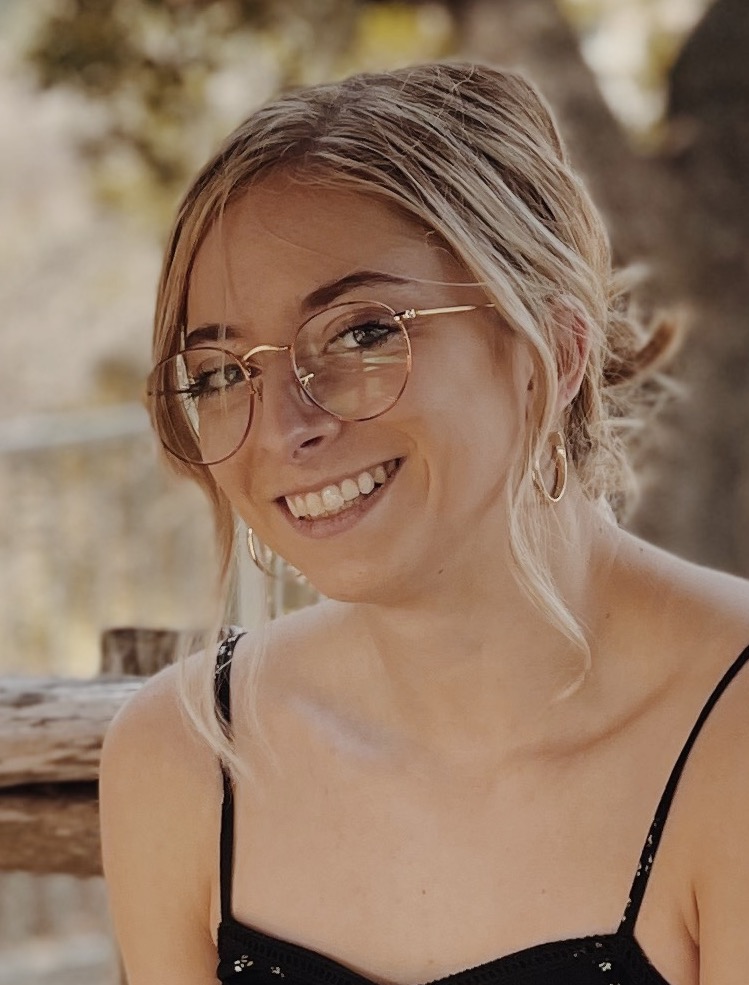
Maddie McNamee is a creative writing intern with Act Locally Waco. She is a student-athlete at Baylor University and is pursuing a major in Professional Writing and Rhetoric.
The Act Locally Waco blog publishes posts with a connection to these aspirations for Waco. If you are interested in writing for the Act Locally Waco Blog, please email Ferrell Foster at [email protected].
By Chase Jensen
World Hunger Relief, Inc., is thrilled to welcome Wacoans back out to the farm this summer!
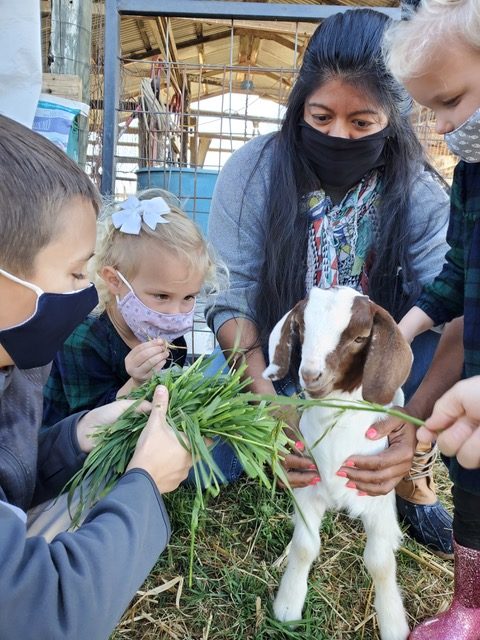
As with so many organizations, our plans last summer were either canceled or seriously reworked to fit into a virtual format. We had a blast with local youth during our online summer program but missed seeing the contagious wonder and curiosity that kids have when they get to explore our farm in person.
While we were able to convert educational opportunities into an online format, all of our community events had to be canceled, including our annual Farm Day and Night on the Farm dinners. But while our city was closed we remained hard at work learning, revising curriculum, and feeding Wacoans through our C.S.A. and our Produce Prescription Program.
We are definitely ready to welcome Waco back to the farm though! In April we were able to host our first Night on the Farm dinner of the year, which featured delicious food, live music, and a beautiful outdoor covered setting (even with a little rain!). Our next Night on the Farm dinner is scheduled for June 3, and we expect it to be just as memorable a time.
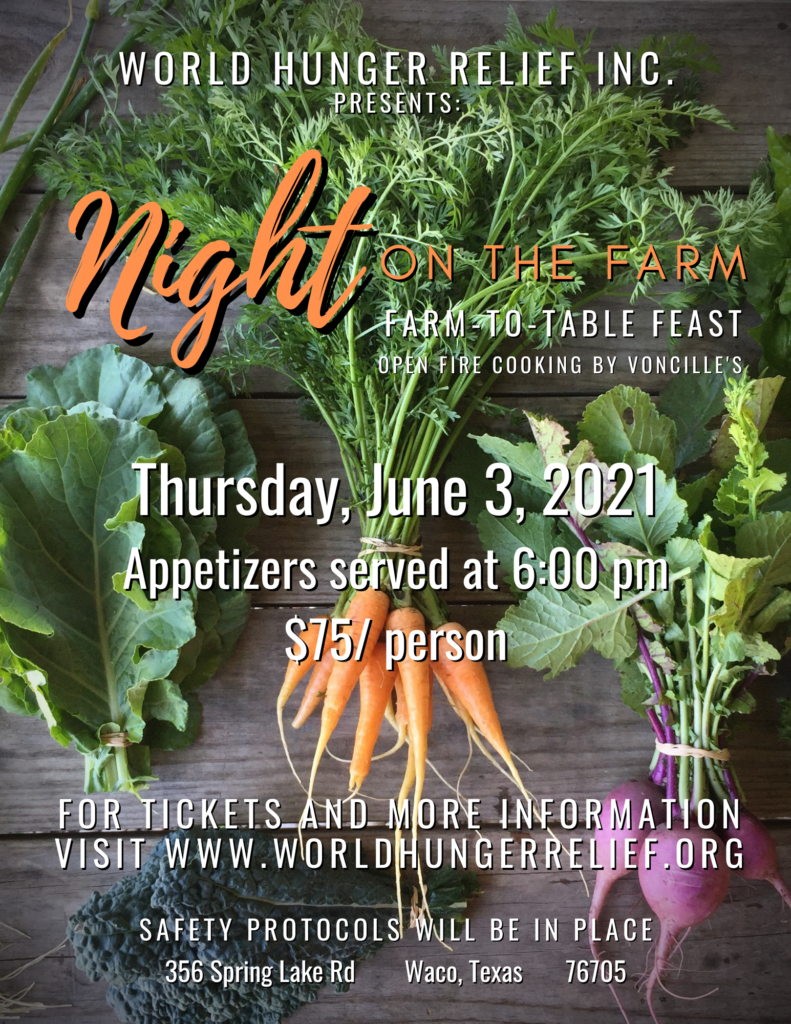
These dinners allow us a chance to show off the farm, give people a chance to taste the food we raise on the farm, and share a bit about our current and upcoming activities. There are still a few spots available, so if you’d like a seat at the table register soon at www.worldhungerrelief.org!
The farm is also hosting two weeks of farm-filled fun for children entering K-6th grade during the weeks of June 7-11 and June 14-18. This day camp will occur Monday-Friday, 7:30 a.m.-12:30 p.m., and includes a healthy snack and lunch. Our theme this year is Farm-to-Table, and we will be learning about different trees, plants and animals on our farm as well as engaging in fun games and engaging crafts. This is a great opportunity for kids to get outside and engage with living things after a long year inside and in front of screens! You can learn more and register by visiting www.worldhungerrelief.org/farm-camp.
Chase Jensen is director of education for World Hunger Relief in Waco.
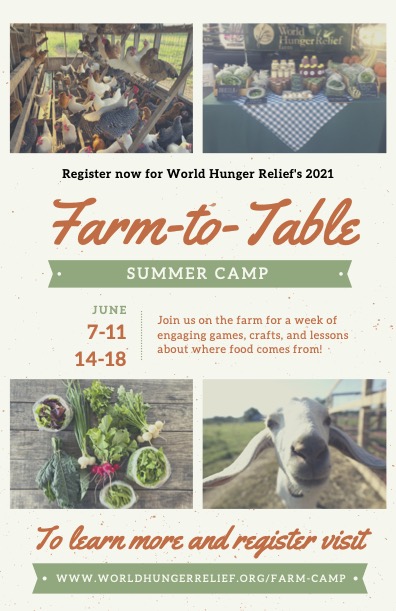
The Act Locally Waco blog publishes posts with a connection to these aspirations for Waco. If you are interested in writing for the Act Locally Waco Blog, please email Ferrell Foster at [email protected].
Again in 2021, the Beaumont Foundation of America has granted Caritas of Waco $50,000 to purchase fresh produce and other nutritional food items for clients needing emergency food assistance. The grant has been given to Caritas every year since 2006 and has supported efforts of the organization to provide healthier food items to people in need.
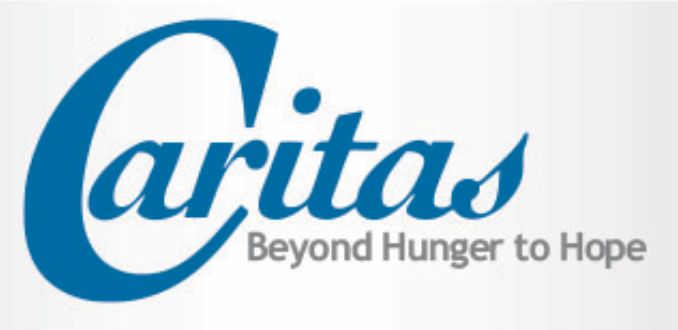
“Nourishing food is essential for families to function optimally,” said Alicia Jallah, Caritas co-executive director. “Caritas is committed to offering the highest level of nutritional food to the thousands of individuals that are struggling with food insecurity in our community. Beaumont Foundation is a strategic partner in the fight against hunger in our community. They continue to provide us with the necessary funds to purchase healthy food options for our pantry.”
In 2020 the food pantry distributed over 5.2 million pounds of food.
Caritas of Waco is a nonprofit that serves McLennan County and the surrounding area by providing individuals and families with urgent support and long-term solutions to poverty. In 2020, Caritas served over 40,680 families with emergency food assistance. For more information on Caritas of Waco or how you can support its community efforts, please visit www.caritas-waco.org or call 254-753-4593.
The Act Locally Waco blog publishes posts with a connection to these aspirations for Waco. If you are interested in writing for the Act Locally Waco Blog, please email Ferrell Foster at [email protected].
By Ferrell Foster
An encounter with a stranger haunts me.
Last month, in the midst of the winter storm, we decided to flee our powerless house for my daughter’s house in another town. It was Tuesday afternoon. We had been without power almost all of the time since 8 a.m. Monday. The temperature had dropped to 2 or 3 degrees outside Tuesday morning.

We motored northward and stopped a little north of town to get gas. Inside the store, I stood in a two-pronged line waiting to check out.
A woman, shorter than me and probably not as old as me, took her place in the line adjacent to me. She smiled big and had a happy lilt in her voice.
“We haven’t had power in two days,” she said.
“I know. We’ve been without power, too,” I responded.
“It got down to 27 degrees in our house last night,” she said, still with a bit of mirth in her voice.
“Oh, my,” or something like that, was all I could say.
Lines advance. She checks out; I check out. We go our ways.
So why can’t I forget this encounter? For a simple reason.
The woman and I both lived through a powerless night when the temperature outside dropped almost to zero. She lived in a 27-degree icebox of a house. The temperature in our house never dropped below 52.
People with resources encounter some of the same challenges in life that those with less resources face, but we do not deal with these challenges on equal footing. Not only did my house keep my family and me much warmer than this woman’s, but we also had someplace to go.
One of my daughters stood in the line with me. After we left, I commented on the woman’s situation in contrast to ours, and Tabitha noted that the woman still seemed to have on her pajamas with a house coat on top. I hadn’t noticed.
This woman was not dressed for travel. Chances are she headed back to her icebox and had to wait who knows how long for relief. Still, she smiled.
Driving northward, Tabitha read me a news account of the power outages in East Waco. This story included a quote from my friend, Waco Council Member Andrea Barefield. She spoke to the importance of alleviating the infrastructure problems in East Waco.
Our neighbors who are most in need should be our highest priority. People in poorer neighborhoods should have the absolute best when it comes to streets, water, and power because they already have enough challenges.
Why is it so often the other way around in cities across this country? It doesn’t have to be; Waco can be different. We can give our best to those who have the least.
We stand or sink together as a community from East Waco to North and South and West. We are Waco; we seek our best.
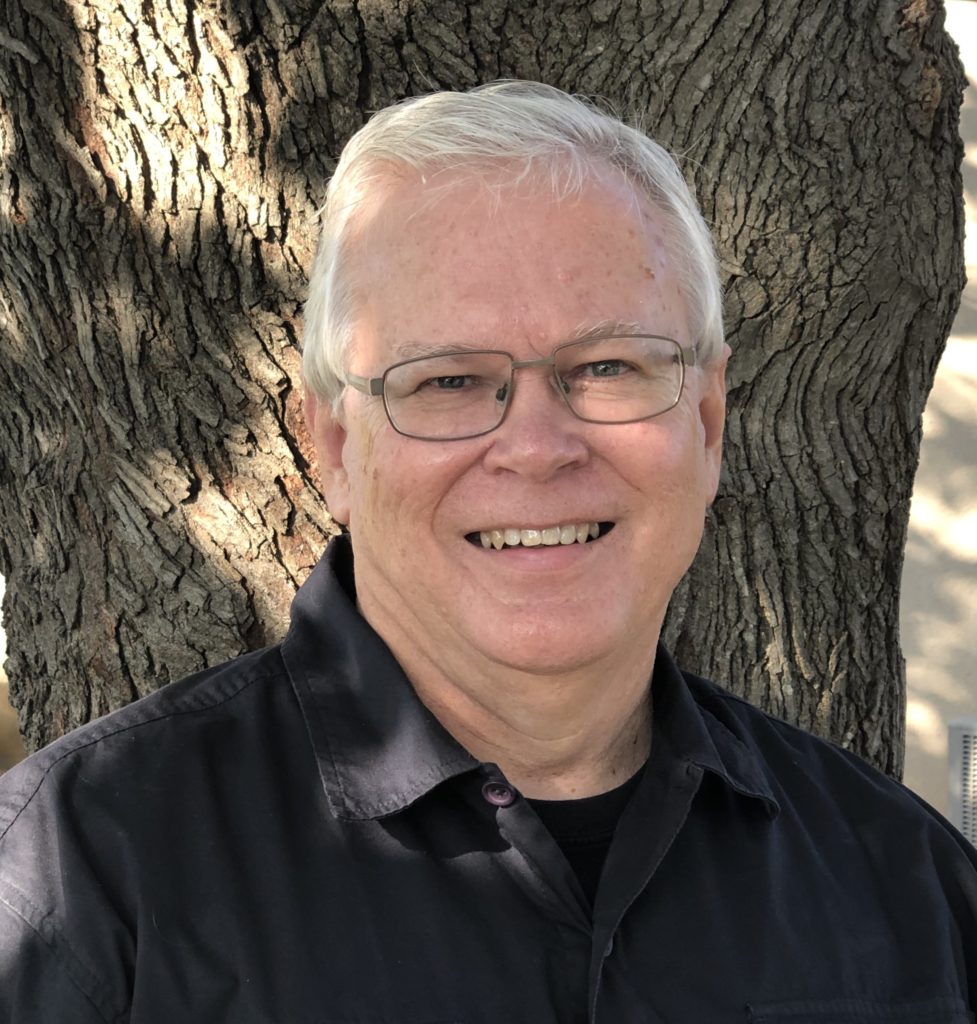
Ferrell Foster is acting executive director of Act Locally Waco and senior content specialist for care and communication with Prosper Waco.
By Ann Owen
We are here to help.
I hope you read Alicia Jallah’s blog last week regarding the numerous services Caritas offers to the community. During this time of much need, Caritas continues to see increasing numbers of individuals and families who are experiencing hardships as never before. Whether it be food, assistance with utilities, case management services and/or assistance with enrollment in state and federal programs such as SNAP (formerly food stamps), Caritas staff are ready to help. If you have a need for which we are unable to provide assistance, we have a long list of community partners to whom we can refer clients.
Things look a little different.
As much in our community has changed due to the pandemic, so has Caritas. In March, we closed our pantry to visitors and implemented a drive-through method of food distribution. Monday through Friday, you will see long lines of cars surrounding the building as staff and volunteers load vehicles with baskets full of groceries. Our Hidden Treasures thrift stores require masks be worn by staff and customers and at times, need to ask customers to wait outside of our buildings as a precaution. If you drop off a donation of food at our downtown warehouse or clothing and merchandise at our thrift stores, you will be met by a staff member wearing a smile under that mask! Although physically things may look differently, our commitment to serving the community has not changed.
Our staff has a heart for service.
We are very proud to have staff members who are truly dedicated to serving others, with compassion and empathy for those who are in difficult situations. All departments within Caritas have an important role in ensuring our clients are treated with the utmost dignity and respect, from choosing healthy foods for our pantry, to a cheerful “Have a blessed day” to clients as vehicles are loaded, to providing a compassionate ear for those who have nowhere else to turn – our job is to assist in any way possible. Sometimes our clients simply need to know that someone cares – and at Caritas, we do.
We understand that it’s hard to ask for assistance.
Often, clients apologize or are embarrassed to ask for help. We see clients from many different seasons in life. Some come from multiple generations of poverty and yearn to become more self-sufficient. Some find themselves experiencing difficulties due to unexpected medical bills or loss of employment. Some are retired and find that their retirement income doesn’t cover the increasing costs of living longer. And this year, many are experiencing difficulties related to the pandemic – such as loss of employment, layoffs or furloughs. Whatever your situation, just know that you will be treated with the dignity and respect that every person deserves.
We could not exist without amazing community partners.
Before the pandemic, we were very fortunate to have a dedicated base of donors and volunteers who support the important services Caritas provides to the community. But oh my, have we been blessed with an amazing outpouring of love and support during this very difficult year! As with many nonprofits, when the pandemic began affecting communities in the spring, we were worried about being able to provide for our clients. It quickly became evident that those worries were unfounded. Individuals, businesses, foundations, civic organizations, churches and other faith-based organizations showered our organization with support to ensure we would be able to continue providing services to what would become an ever-increasing number of individuals and families in our community. We send a virtual hug to each and every one of you.
The struggles are far from over and the future remains uncertain, so we need your continued support – by volunteering your time to assist in the distribution line for our pantry, by donating food or hosting a food drive, or by supporting us with a monetary donation.
The word “Caritas” means “love” in Latin, and we continue to witness love and humanity as our community comes together to support those who are affected by these trying times.
Thank you all as we continue our quest to move our clients beyond hunger to hope.

Ann Owen entered the nonprofit world as a professional fundraiser in 1997 after serving numerous organizations as a volunteer. She joined the staff of Caritas in 2014 as their first Director of Development, with hopes of making an impact on those in our community who struggle in the grasps of poverty. She currently has the honor of serving as Co-Executive Director at Caritas of Waco. Ann and her husband are lifelong residents of Waco and have two adult children.
The Act Locally Waco blog publishes posts with a connection to these aspirations for Waco. If you are interested in writing for the Act Locally Waco Blog, please email [email protected] for more information.
(Press Release) The leadership team for the Heart of Texas CROP Hunger Walk invites you to our virtual walk on Nov. 15!
Over the past 50 years, tens of thousands of walkers have raised more than $500 million through the annual CROP Hunger Walk. The Heart of Texas CROP Hunger Walk always raises around $2,500, making it one of the most successful fundraisers for a small community walk.
This year, because of the coronavirus pandemic and the need for social isolation, we are introducing a Virtual walk.
We know that it is crucial that we find new ways to engage our community to continue giving to Church World Service and Caritas of Waco, the two recipients of the walk’s funds. The current pandemic is creating an ever-increasing need for food and resources for our local agencies and around the world. Caritas, for instance, is serving more than twice as many families as it did before COVID-19 reached our community.
The need is greater than ever. Now, more than ever, is the time to give.
This year the Heart of Texas CROP Hunger Walk and some 700 other communities nationwide are joining together in interfaith walks around the theme Ending hunger one step at a time.
Here are four ways to participate:
- You can sign up online at https://www.crophungerwalk.org/wacotx and walk on November 15 in isolation or with your family. (Be sure to take photos and announce on social media that you are joining the walk! Go to https://www.facebook.com/HeartofTexasCROPHungerWalk and tag us!)
- You can sign up online at https://www.crophungerwalk.org/wacotx and walk in spirit.
- You can sponsor someone else who is walking in isolation.
- You can video yourself walking before Walk Day and send us the video, which we will incorporate into our virtual presentation, set for 3:00 pm on Nov. 15. (Videos are due by Oct. 31 to be included in the Nov. 15 presentation. Please email [email protected] for instructions.)
In doing any of these things, you will show your solidarity with the millions of neighbors around the world who must walk to live. You will also show your solidarity with the millions served by local food pantries, food banks and meal sites in the United States and in our community.
The local beneficiary for the Heart of Texas walk is Caritas of Waco. Founded in 1967, it is a community-wide agency with interfaith support. Located at the corner of 15th & Mary in downtown Waco, the organization normally includes an emergency assistance program for utilities, rent and medicine; two thrift stores and a thrift store warehouse; one of the largest food pantries in Central Texas; and a Case Management program. In March, Caritas reorganized its services, implementing a drive-through food pantry, in order to meet the soaring need and keep its staff and clients safe. The number of people coming to the pantry for food (formerly more than 100 families a day) more than doubled and continues to increase. (For information and updates, call 254-753-4593, go to www.caritas-waco.org, or check the Caritas Facebook page at https://www.facebook.com/caritasofwaco.)
The international beneficiary is Church World Service (CWS), the relief and development organization that sponsors CROP Hunger Walks. In an effort to fight hunger and build healthier communities, CWS provides clean water and hygiene training in Vietnam, combats droughts in Nicaragua, and stocks shelves in hundreds of food pantries across the United States. Hundreds of CWS workers are responding in creative ways to COVID-related crises all over the world.
It’s easy to sign up and donate to our walk. Go to https://www.crophungerwalk.org/wacotx and click “register” or “donate.” You and your team members can make donations by credit card and or PayPal, and a receipt will be sent through email for tax purposes. Once you sign up, we will send you a link to the Nov. 15 celebration.
By Sai Sagireddy
I sit down today with a smile on my face, writing this story after ten-weeks of scrupulous research, calls, emailing, outreach, and one completed medical guide.
I must be honest. In the first few weeks, I didn’t think I could’ve taken on a project of this size. I was frequently drowning under waves of information. I didn’t know how to present what I had. I didn’t know how to continue. More often than not, I felt an urge to close my pen, shut down my laptop, and walk away. But one thing kept me going:
The thought of a disadvantaged person opening a medical guide in Waco, TX, and finding the specific healthcare service they require – free of cost.
This is the goal of the Waco Low-Income Healthcare Resources Guide.
The Start
Back in May, after committing to Baylor, I needed a medical insurance plan.
(For 15 years, I’ve lived in Trinidad & Tobago. Here, general healthcare is free – both for residents and foreigners. So health insurance wasn’t necessary).
In the US, medical costs surprised me. How can low-income families afford this? What are the resources available to them? To me, answers to these questions are so essential, especially with the COVID-19 pandemic.
From that day, I worked to comprehend the US healthcare system. I grew to understand the populations within Waco and how they receive care. Many programs cater to disadvantaged Waco residents. However, no resources are available to connect these populations to the plans, so services are potentially being under-used. I wanted to find a way to bring about awareness – a critical factor in effecting change.
Setting the Stone in Place
I brought up my thoughts with a mentor of mine: Cyrus Buckman, Stanford School of Medicine Class of 2024. He motivated me to work on improving healthcare accessibility in Waco.
A few days later, by chance, I met Ethan Lowder, WashU Class of 2022. He is the president of Heart for the Homeless, a non-profit that aims to improve the health of the homeless through primary care and knowledge. Ethan educated me further on the lifestyle and needs of disadvantaged populations. He told me about his group’s resources project and the healthcare guide for St. Louis, MO.
His expertise showed me that a healthcare resources guide detailing healthcare resources in Waco. Especially so with over twenty-nine percent of the city currently living under the federal poverty line. Upon further conversation, Ethan agreed to mentor me as I author the guide.
The Work
Over seven weeks, I’ve obtained data on healthcare institutions and programs catered for low-income Waco families. For two weeks after that, I’ve used the information gathered to “binge-write” the book.
The project also has contributions from several independent-collaborators. Juan Marinangeli translated the guide into Spanish. Ava Hunwick worked on the guide’s digital design. Sherwin Newton produced the maps. Hannah Payne connected collaborators. Matthew Gopaulchan proof-read the guide and worked on the glossary.
The Guide
The Waco Low-Income Healthcare Resources Guide contains information on over ninety medical institutions and fifteen healthcare programs that cater to low-income families and disadvantaged individuals within the Waco area. It is designed to be a vital tool for homeless individuals & needy populations directly, organizations focused on serving low-income families, and health & social service professionals.
(The guides were designed in a way for homeless populations to find a specific service within a physical copy, by themselves, easily.)
Moreover, it will help homeless shelter directors to inform individuals about healthcare options, student organizations & non-profit groups focused on service, and prehealth & health groups in the Waco area and beyond.
English:
https://drive.google.com/file/d/1SXG6rArR2JTI0Zi0tllXRJa2wexoSANJ/view?usp=sharing
Spanish:
https://drive.google.com/file/d/1qQyKN22Ry1jYQUl6KRIS7UPwwVbU3Rqi/view?usp=sharing
Funding Needs
While an online guide format is very versatile for health & social service working professionals, it will not do for homeless populations. They need physical copies.
The main focus of this project is to remove barriers to healthcare. And technology can become a barrier. These guides can be used by homeless populations directly. However, with limited computer literacy, a homeless individual within a shelter would be unable to use a digital version. They need physical copies. Moreover, in soup kitchens, physical guides can be easily used by transient members to help populations.
We are currently actively seeking funding partners to print 100 physical copies of the guide. These copies will be placed in homeless shelters, organizations, non-profit groups, and departments in Waco for low-income populations to use. They will not be removed from their home locations. They can be borrowed in-house and then returned. If interested, please contact me directly at [email protected].
My sincerest hope is that this guide will go on to help as many individuals as it possibly can.
Some things I learned
Over the past few weeks, I’ve learned a lot.
I now promote a collaborative mindset towards everything I do. This guide would not have been the same without the input & feedback from individuals: both collaborators and mentors. Collaborations allow us to combine particular strengths & skill sets to create the best outcome.
Outside of organized events & projects, I’ve also seen first-hand that creative methods and “outside-the-box” strategies can be successfully used to tackle a problem or need. All it takes is a leap of faith!
I’ve learned the importance of compassionate mentorship. Dr. Diaz-Espinoza, Associate Director of Baylor’s ALD, has been working to gather resources. He introduced me to Mr. Peacock, Assistant Director within Baylor’s External Affairs, and Dr. Beverly, SC, for Community Service. Mr. Peacock has been driving outreach efforts and has identified essential city projects the guide can be integrated with. Without this care and time, our distribution efforts may have been much more challenging.
Final thoughts
Reading back over what I have written makes me think: wow, it has been quite a journey.
Going in, I was lost. I didn’t know where to begin. What to do. Now, I have authored the Waco Low Income Healthcare Resources Guide, a medical services book that contains comprehensive information about the healthcare services available to the needy within Waco. It acts as a bridge that connects these populations to medical services via independent community-based organizations.
Throughout this journey, I’ve found a community equally passionate about service. I’ve gained mentors nationwide who share my goals. I’ve developed a malleable skillset that I can use within my academics and projects. I’m forever grateful!
This guide’s digital edition will soon be available through several online local and regional databases for use. However, we are still actively seeking funding for physical copies.
If you have any questions whatsoever about the project, if you want to get involved in this effort or future project, or if you are a potential financial collaborator, please reach out directly to [email protected].
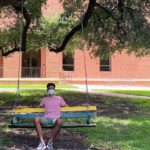
Sai Sagireddy is an incoming freshman at Baylor University. He is part of Baylor’s University Scholars Cohort Class of 2024 with concentrations in biology/biochemistry, Spanish, and medical humanities (pre-med). He is passionate about research, global health, healthcare management, health equity & health accessibility. In his free time, he enjoys the company of others, settling down a good book, exercising, hiking, traveling, and exploring the outdoors.
The Act Locally Waco blog publishes posts with a connection to these aspirations for Waco. If you are interested in writing for the Act Locally Waco Blog, please email [email protected] for more information.
